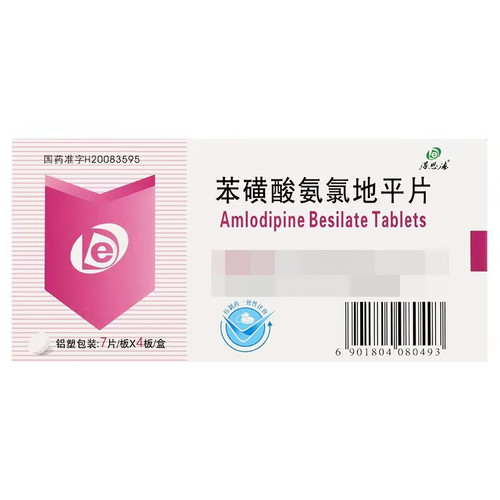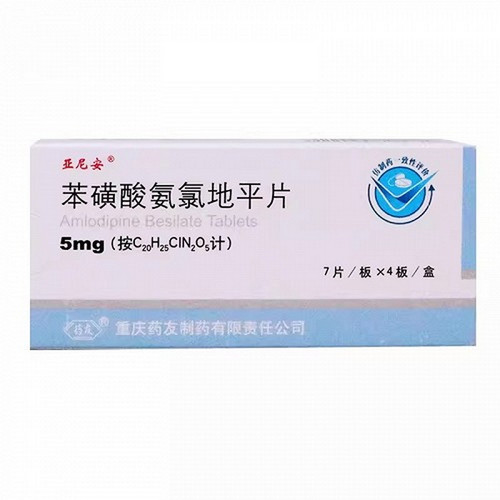Product Overview
[Drug Name]
Generic Name: Amiflodipine Besylate Tablets
Trade Name: Xinping Amiflodipine Besylate Tablets 5mg*28s
Pinyin Full Code: ZuoPingBenHuangSuanAnLvDiPingPian 5mg*28s
[Main Ingredient]
3-Ethyl-5-methyl-2-(2-aminoethoxymethyl)-4(2-hydrophenyl)-1,4-dihydro-6-methyl-3,5-pyridinedicarboxylate benzenesulfonate
[Indications/Main Functions]
1. Hypertension: This product is indicated for the treatment of hypertension. It can be used alone or in combination with other antihypertensive drugs. Hypertension control is part of a comprehensive cardiovascular risk management strategy that may include lipid control, diabetes management, antithrombotic therapy, smoking cessation, physical exercise, and sodium restriction. Increases in systolic or diastolic blood pressure increase cardiovascular risk. The absolute risk increase per mmHg increase in blood pressure is higher at higher baseline blood pressure levels. The relative degree of risk reduction achieved by lowering blood pressure is similar among populations with varying absolute cardiovascular risk. In patients with severe hypertension, even a small reduction in blood pressure can provide significant clinical benefits. In adults with hypertension, lowering blood pressure generally reduces the risk of cardiovascular events, primarily stroke and myocardial infarction. 2. Coronary Artery Disease (CAD) Chronic Stable Angina: This drug is indicated for the symptomatic treatment of chronic stable angina. It can be used alone or in combination with other antianginal medications. Vasospastic Angina (Prinzmeta’s or Variant Angina): This drug is indicated for the treatment of confirmed or suspected vasospastic angina. It can be used alone or in combination with other antianginal medications. In patients with angiographically confirmed CAD but an ejection fraction >40% and no heart failure, this drug can reduce the risk of hospitalization for angina and the need for coronary revascularization.
[Specifications]
5mg*28s
[Dosage and Administration]
1. The initial dose for the treatment of hypertension is 5 mg once daily, with a maximum dose of 10 mg once daily. For frail or elderly patients, or those with hepatic insufficiency, the initial dose is 2.5 mg once daily. This dose may also be added to the dose currently used for other antihypertensive medications. Dose adjustments should be made based on individual patient response. Generally, dose adjustments should be initiated after 7-14 days. If clinically necessary, dose adjustments may be initiated sooner after close observation. 2. The initial dose for the treatment of angina pectoris is 5-10 mg once daily. A lower dose is recommended for elderly patients and those with hepatic insufficiency. The effective dose for most patients is 10 mg/day.
[Adverse Reactions]
Amifedipine is well tolerated. In placebo-controlled clinical trials for the treatment of hypertension or angina pectoris, the most common side effects were: 1. Autonomic nervous system: flushing. 2. General: fatigue. 3. Cardiovascular, general: edema. 4. Central and Peripheral Nervous System: Dizziness, headache. 5. Gastrointestinal: Abdominal pain, nausea. 6. Heart Rate/Rhythm: Palpitations. 7. Psychological: Drowsiness. No significant clinical laboratory abnormalities related to this product were observed in these clinical trials. Less common adverse events observed post-marketing include: 1. Autonomic Nervous System: Dry mouth, increased sweating. 2. General: Weakness, back pain, malaise, pain, weight gain/loss. 3. Cardiovascular, General: Hypotension, syncope. 4. Central and Peripheral Nervous System: Hypertonia, hypoesthesia/paresthesia, peripheral neuropathy, forehead palpitations. 5. Endocrine: Breast hyperplasia. 6. Gastrointestinal: Changes in bowel habits, dyspepsia (including gastritis), gingival hyperplasia, pancreatitis, vomiting. 7. Metabolic/Nutritional: Hyperglycemia. 8. Musculoskeletal: Arthralgia, muscle cramps, myalgia. 9. Platelet/Bleeding/Coagulation: Purpura, thrombocytopenic purpura. 10. Psychological: Impotence, insomnia, attitude change. 11. Respiratory: Cough, dyspnea. 12. Skin/Appendages: Hair loss, skin discoloration. 13. Special Senses: Taste disturbances, tinnitus. 14. Urinary: Frequent urination. 15. Vascular (extracardiac): Vasculitis. 16. Vision: Visual impairment. 17. Leukocyte/Reticuloendothelial System: Leukopenia. Hypersensitivity reactions are rare and include pruritus, rash, angioedema, and erythema multiforme. Very rare cases of hepatitis, jaundice, and elevated transaminases (usually consistent with cholestasis) have been reported. Severe cases requiring hospitalization have been reported in association with the use of amiloride. However, in most cases, a causal relationship has not been established. Similar to other calcium-replacement antagonists, the following adverse events have been reported rarely, but these events are difficult to distinguish from the natural history of the underlying disease: myocardial infarction, arrhythmias (including bradycardia, ventricular tachycardia, and atrial fibrillation), and chest pain.
[Contraindications]
This product is contraindicated in patients with hypersensitivity to dihydropyridines or any of its components.
[Drug Interactions]
Cimetidine, grapefruit juice, and acidogens: Coadministration does not alter the pharmacokinetics of this product. Atorvastatin, digoxin, and ethanol: This product does not affect their pharmacokinetics. Sildenafil: Single-dose sildenafil (Viagra) has no effect on the pharmacokinetics of this product in patients with essential hypertension. The two drugs produce an independent antihypertensive effect when taken together. Warfarin: This product does not alter the prothrombin action time of warfarin. Digoxin, phenytoin, and warfarin: Coadministration with this product has no effect on plasma protein binding. Anesthetics: Inhaled hydrocarbons and this product may cause hypotension. Nonsteroidal anti-inflammatory drugs (NSAIDs), especially indomethacin, may weaken the antihypertensive effect of this drug. Anti-blockers: Coadministration with this drug is well tolerated but may cause excessive hypotension and, rarely, worsening heart failure. Estrogens: Coadministration may cause fluid retention and increase blood pressure. Sulfinpyrazone: Coadministration may increase the protein binding of this drug, resulting in fluctuations in blood concentrations. Lithium: Coadministration may cause neurotoxicity, resulting in nausea, vomiting, diarrhea, ataxia, tremor, and/or numbness; caution is advised. Sympathomimetic amines: May weaken the antihypertensive effect of this drug. Sublingual nitroglycerin and long-acting nitrate preparations: Coadministration with this drug may enhance the antianginal effect. Although rebound effects have not been reported, the dose should be gradually reduced under the guidance of a physician when discontinuing the drug. Purine diuretics, ACE inhibitors, digoxin, warfarin, antibiotics, and oral hypoglycemic agents: Can be safely used with this drug.
[Precautions]
1. Warning: A very small number of patients, particularly those with severe coronary artery obstructive disease, may experience increased frequency, prolonged duration, and/or worsening of angina pectoris, or acute myocardial infarction, when initiating calcium channel blocker therapy or increasing the dose. The mechanism of action is currently unknown.
2. Because the vasodilatory effect of this drug develops gradually, rare cases of acute hypotension have been reported after taking this drug. However, caution should be exercised when using this drug in combination with other peripheral vasodilators in patients with severe aortic stenosis.
3. Use in Patients with Heart Failure: Calcium channel blockers should be used with caution in patients with congestive heart failure. In long-term, placebo-controlled studies in patients with non-ischemic heart failure (NYHA class III-IV),
[Pediatric Use]
Safety and efficacy in children have not been established.
[Elderly Use]
Clinical studies have not demonstrated that elderly patients respond differently to this drug than younger patients. However, given that elderly patients often have impaired liver, kidney, and heart function, as well as other medical conditions and medications, the lower end of the initial dose range is generally used. Elderly individuals have decreased clearance of this drug, with the average active over (AUO) increasing by approximately 40% to 60%, necessitating a lower initial dose.
[Pharmacology and Toxicology]
Amifedipine is a calcium blocker (also known as a slow-channel blocker or calcium antagonist) that blocks the transmural entry of calcium ions into myocardial and vascular smooth muscle cells.










